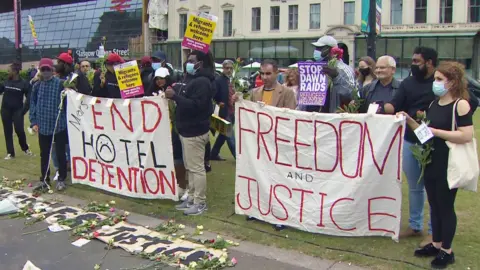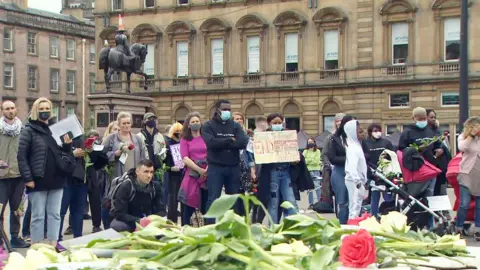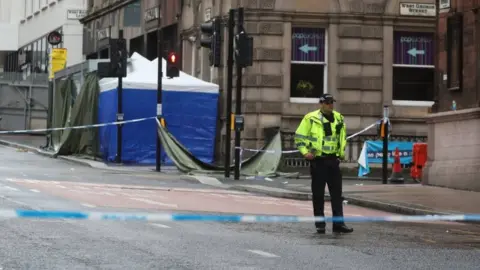Asylum campaigners mark Glasgow knife attack anniversary
 BBC
BBCCampaigners have marked the first anniversary of a knife attack at a Glasgow hotel which left six people injured, including a police officer.
Attacker Badreddin Abadlla Adam, 28, from Sudan, was shot dead by police in the incident at the Park Inn.
Campaign group Refugees For Justice called for an inquiry into the decision to house asylum seekers in the hotel.
It said the tragedy was a "direct result of the dysfunctional UK asylum support and accommodation system".
The Home Office said it was necessary to use the Park Inn as temporary accommodation for asylum seekers during the Covid pandemic.
Refugees For Justice gathered in the city's George Square where they laid flowers, lit candles and read poems.
Event organiser Pinar Aksu told BBC Scotland the system was "a hostile environment" for asylum seekers.
She added: "Some were trafficked or had experienced traumatising events in their life.

"We are still trying to figure out why people were taken away from homes, where their asylum support was cut, where there was no wellbeing or mental health support, where the conditions were quite traumatising and horrifying.
"If people were not moved into hotels, things could have been avoided, the city would not have gone through this."
Concerns had previously been raised over living conditions. Migrant charity Positive Action in Housing said that many people claimed to have no windows or fresh air in rooms.
 PA Media
PA MediaRobina Qureshi, the charity's director, said it amounted to a "humanitarian crisis" for vulnerable people - some of whom were pregnant women, children and trafficking survivors.
Glasgow City Council is the only local authority in the country to take in asylum seekers through the UK government's dispersal scheme.
Earlier this month, the BBC reported that there were still 200 asylum seekers living in hotels across the city.
Council leader Susan Aitken said a ban on accepting new asylum seekers would continue while the asylum-housing scheme was run "on the cheap" by the housing firm Mears Group, which runs a reported £1 billion a year refugee housing contract for the UK government.
 Police Scotland
Police ScotlandMs Aitken said: "We do not think [hotels] is appropriate accommodation, and we do not think it should be long-term.
"It is, and must always be thought of, as a temporary emergency response - that emergency response has now gone on far too long, for far too many asylum seekers."
The Home Office has previously defended the measures, saying: "Like everyone else in the country during the coronavirus outbreak, asylum seekers have been asked to stay where they are and to follow social distancing to help fight the spread, which has meant standing up temporary accommodation.
"When staying in hotel accommodation, all essential living needs - including three meals a day, healthcare, WiFi and TV - are met, which is all paid for by the taxpayer and there is no cost to the individual."
